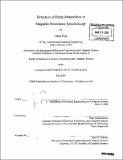Detection of brain metabolites in magnetic resonance spectroscopy
Author(s)
Kok, Trina
DownloadFull printable version (18.39Mb)
Other Contributors
Massachusetts Institute of Technology. Dept. of Electrical Engineering and Computer Science.
Advisor
Elfar Adalsteinsson.
Terms of use
Metadata
Show full item recordAbstract
While magnetic resonance imaging (MRI) derives its signal from protons in water, additional and potentially important biochemical compounds are detectable in vivo within the proton spectrum. The detection and mapping of these much weaker signals is known as magnetic resonance spectroscopy or spectroscopic imaging. Among the complicating factors for this modality applied for human clinical imaging are limited chemical-shift dispersion and J-coupling that cause spectral overlap and complicated spectral shapes that limit detection and separation of several brain metabolites using MR spectroscopic imaging. Existing techniques for improved detection include so-called 2D spectroscopy, where additional encoding steps aid in the separation of compounds with overlapping chemical shift. This is achieved by collecting spectral data over a range of timing parameters and introducing an additional frequency axis, fl. Spectral editing techniques attempt to enhance metabolite signal detection along fl in order to resolve specific metabolite signals. While these techniques have been shown to improve signal separation, they carry a penalty in scan time and more complicated reconstruction compared to conventional spectroscopy, and are often prohibitive when combined with spectroscopic imaging. The task of this thesis is to characterize and optimize existing 2D spectroscopy techniques for improved metabolite resolution with reduced number of timing steps through numerical simulation and experimental validation in phantoms.
Description
Thesis (S.M.)--Massachusetts Institute of Technology, Dept. of Electrical Engineering and Computer Science, 2009. Includes bibliographical references (p. 59-61).
Date issued
2009Department
Massachusetts Institute of Technology. Department of Electrical Engineering and Computer SciencePublisher
Massachusetts Institute of Technology
Keywords
Electrical Engineering and Computer Science.